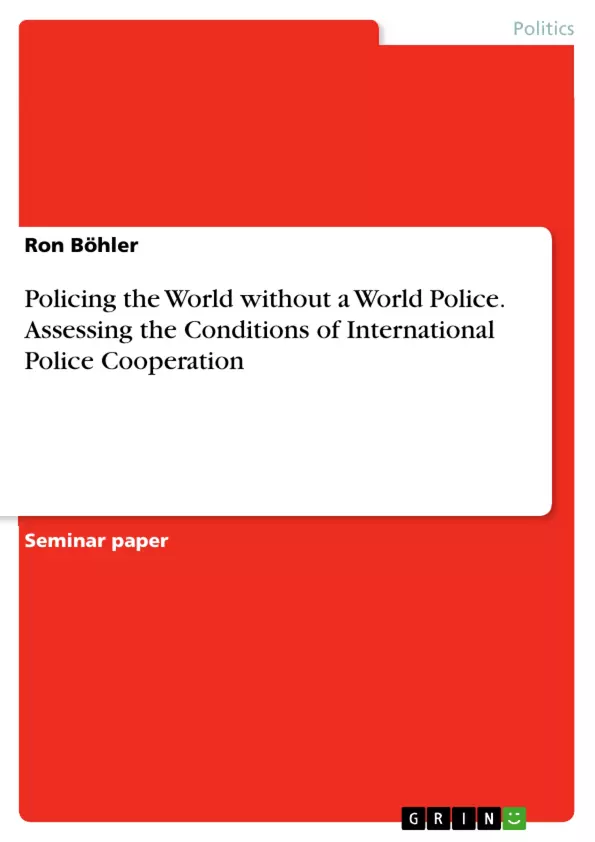In a speech in 2006, the Secretary General of the International Criminal Police Organization (ICPO) referred to Interpol as ‘the world’s largest international police organization, the world’s only global police organization, and the world’s most effective international police body’. With 188 member countries the ICPO is the second largest international organization after the United Nations , based on intergovernmental cooperation between domestic law enforcement services, the so called National Central Bureaus (NCB). In times when transnational (organized) crime and terrorism increase exceedingly through globalization and the internationalization of transportation and communication systems as well as international trade, the global role of Interpol and the need to react rapidly and effectively emerge as well. Whenever two or more countries are involved in a criminal act, it is a matter of the International Criminal Police Organization.
National police agencies adopt a double role: As a states executive branch they are not fully independent from political interventions. The national justice system and the securing of civil society are subjects to the state in order to control social violence and destruction, and to protect the citizens from victimization in the domestic arena. In short: It is a matter of state sovereignty. Related to the international level and the membership in Interpol, the police can instead not be equated with national governments. The NCBs are the `key element[s] in the day-to-day performance of the tasks identified with Interpol´ and are consequently political actors in international relations.
Inhaltsverzeichnis (Table of Contents)
- Introduction
- State of Research
- Theories of International Cooperation
- The Object of Investigation: The ICPO - Interpol
- Theoretical Framework & Hypotheses Generation
- The Dependent Variable
- Explanatory Independent Variables
- Methodology
- Fuzzy Set Qualitative Comparative Research (fsQCA)
- Operationalization of (in)dependent variables
- Case Selection
- Conclusion
Zielsetzung und Themenschwerpunkte (Objectives and Key Themes)
This research project aims to assess the conditions shaping closer cooperation in global law enforcement within the International Criminal Police Organization (ICPO) - Interpol. It investigates the degree of participation of fifteen selected countries within the scope of intergovernmental cooperation, identifying inhibiting variables and potential solutions to overcome obstacles. The study further explores the effectiveness of international coordination and collaboration beyond individual nation states as classic actors in international relations.
- The role and effectiveness of Interpol in facilitating global police cooperation.
- The challenges and opportunities of intergovernmental cooperation in law enforcement.
- The impact of globalization and transnational crime on international police collaboration.
- The factors influencing the level of participation of individual states in Interpol.
- The potential for alternative models of international police cooperation beyond nation states.
Zusammenfassung der Kapitel (Chapter Summaries)
- Introduction: This chapter sets the scene by introducing Interpol as the world's largest international police organization and discussing the challenges posed by transnational crime in a globalized world. The research question is formulated, focusing on the conditions shaping closer cooperation within Interpol.
- State of Research: This chapter provides an overview of existing theories of international cooperation, including realism, institutionalism, and transnationalism. It critiques the applicability of these theories to explain police cooperation and highlights the unique characteristics of Interpol as a global law enforcement network.
- Theoretical Framework & Hypotheses Generation: This chapter outlines the theoretical framework used in the research, defining the dependent variable (level of cooperation) and identifying potential explanatory independent variables. The chapter concludes with the formulation of hypotheses to be tested in the subsequent analysis.
- Methodology: This chapter describes the research methodology employed, including fuzzy set qualitative comparative analysis (fsQCA). It explains the operationalization of variables and the selection of cases for analysis.
Schlüsselwörter (Keywords)
The primary focus of this research lies on international police cooperation, Interpol, transnational crime, globalization, intergovernmental cooperation, state sovereignty, and fuzzy set qualitative comparative analysis (fsQCA). It investigates the factors influencing the level of participation of individual states in Interpol, exploring potential inhibiting variables and proposing solutions to enhance global law enforcement collaboration.
Frequently Asked Questions
What is the primary role of Interpol in global policing?
Interpol, or the ICPO, acts as the world's only global police organization, facilitating intergovernmental cooperation between domestic law enforcement services to combat transnational crime and terrorism.
How many member countries belong to the International Criminal Police Organization (ICPO)?
The ICPO has 188 member countries, making it the second largest international organization after the United Nations.
What are National Central Bureaus (NCBs) in the context of Interpol?
NCBs are the domestic law enforcement services of member countries that act as the key elements in the day-to-day performance of tasks identified with Interpol, serving as political actors in international relations.
How does globalization impact international police cooperation?
Globalization increases transnational organized crime and terrorism through the internationalization of transportation, communication systems, and trade, necessitating more rapid and effective global police reactions.
What is the focus of the research methodology fsQCA mentioned in the document?
Fuzzy Set Qualitative Comparative Analysis (fsQCA) is used to assess the conditions shaping closer cooperation and the degree of participation of selected countries within Interpol.
Are national police agencies fully independent from political intervention?
No, as part of a state's executive branch, national police agencies are not fully independent from political interventions, as they are subjects to state sovereignty.
- Quote paper
- Ron Böhler (Author), 2010, Policing the World without a World Police. Assessing the Conditions of International Police Cooperation, Munich, GRIN Verlag, https://www.grin.com/document/376507



